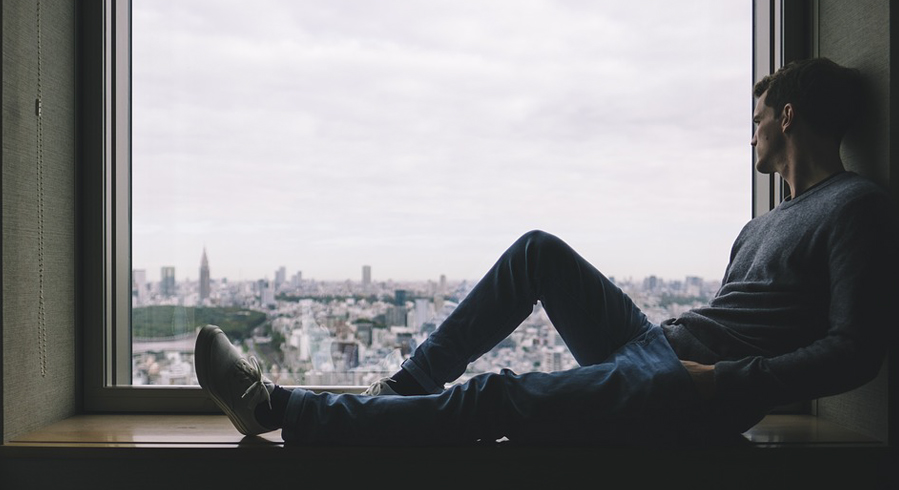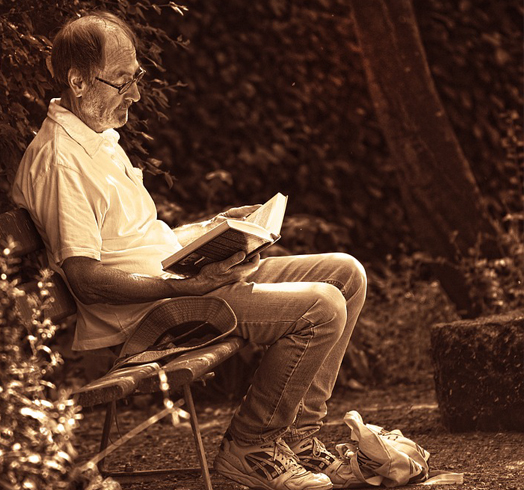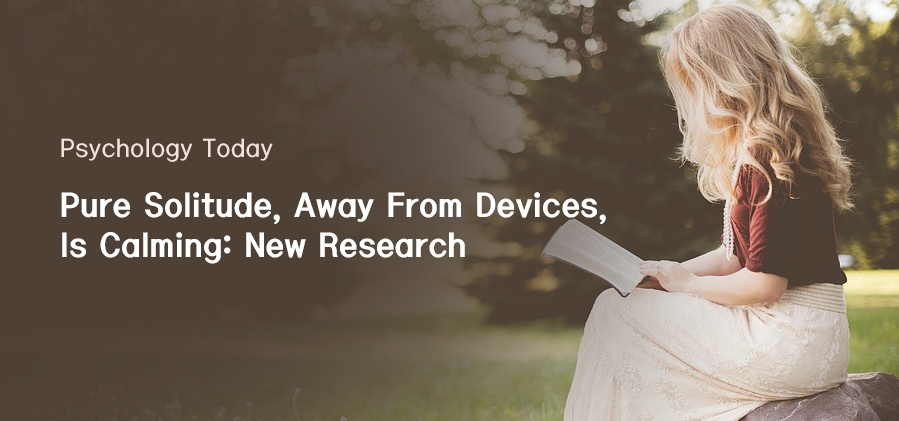4 new studies on the positive psychology of spending time alone without devices (Posted Nov 17, 2017 )
The psychological experience of being truly alone, with no electronic devices handy and no other people to talk to, can be calming. Thuy-vy T. Nguyen, a Ph.D. student, and Professors Richard M. Ryan and Edward L. Deci, all from the University of Rochester, demonstrated the emotional implications of solitude in four studies (link is external)just published in the Personality and Social Psychology Bulletin.
전자기기를 멀리 두고, 대화 할 사람 없이 완전히 혼자가 되는
심리학적 경험은 평온을 가져올 수 있다. University of Rochester의
박사 과정생 Thuy-vy T. Nguyen와 Richard M. Ryan 교수와 Edward
L. Deci 교수는 고독의 감정에 관한 영향을 Personality and Social
Psychology Bulletin에 개제된 4개의 연구에서 보여주었다.
Spending time alone dampened the intensity of the emotions that people experienced, both positive and negative. Alone time also increased feelings of peacefulness, calm, and relaxation. Under some conditions and for some people, alone time also increased feelings of sadness, boredom, and loneliness.
홀로 시간을 보내는 것은 감정의
정도를 긍정적인 것이든 부정적인 것이든 모두 약화시켰다.홀로 보내는
시간은 또한 평화로움, 평온함,
안식의 느낌을 강화하였다. 특정한
조건에서 어떤 사람들은 홀로 보내는
시간이 슬픔, 지루함, 외로움의
느낌을 강화하였다.
In the pure solitude condition in three laboratory experiments, participants sat alone for 15 minutes in a comfortable chair, away from their electronic devices, without engaging in any activities. They described their emotions on rating scales at the beginning of the experiment and again at the end.
3개의 실험에서 제시한 완전한
고독의 조건에서는 피험자를 어떠한
전자기기나 활동 없이 15분간
편안한 의자에 홀로 앉아있게 했다.
피험자는 실험 시작과 실험이 끝난
시점에서 자신의 감정을 점수로
나타내었다.
Participants were asked about their positive emotions that were relatively intense or arousing (e.g., feeling excited, enthusiastic, energized) as well as their negative emotions that were relatively intense (e.g., feeling anxious, angry, jittery). They also reported on their relatively less intense positive emotions (e.g., feelings of peacefulness, calm, and relaxation) and their relatively less intense negative emotions (e.g., feelings of sadness, boredom, and loneliness).
피험자는 비교적 강렬하고
자극적인 긍정적 감정에(예: 흥분,
즐거움, 활력이 넘침) 대한 질문과
비교적 강렬한 부정적 감정(예:
불안, 화남, 초조함)에 대한 질문을
받았다. 피험자들은 또한 비교적 덜
강렬한 긍정적 감정(예: 평화로움,
평온함, 안정됨)과 덜 강렬한 부정적
감정(예: 슬픔, 지루함, 외로움)에
대한 질문을 받았다.
Typically, across the four studies, the participants who experienced 15 minutes of pure solitude felt the intense emotions (both positive and negative) less intensely. In that sense, solitude was calming: People felt less excited, energized, anxious, and angry after sitting alone with no devices than they had before. They also felt calmer, more relaxed, and more peaceful. Sometimes, some people felt sadder, lonelier, or more bored.
네 편의 연구 모두에서 완전한
고독을 경험한 피험자는 대개
강렬한 감정을(긍정적, 부정적
감정 모두) 덜 강렬하게 경험했다.
이러한 의미에서 고독은 평온을
가져온다. 사람들은 전자기기 없이
홀로 앉아있었을 때 이전보다 덜
흥분하고, 덜 활력이 넘치고, 덜
화냈다. 또한 더 평온하고 더 안식을
느끼며 더 평화로움을 느꼈다. 때로
몇몇 사람들은 더 슬프고 외롭고
지루하다고 느꼈다.
One of the studies compared people in the pure solitude condition to people who instead spent their 15 minutes having a getting-acquainted conversation with a research assistant. Only the experience of pure solitude was calming.
한 연구에서는 완전한 고독 속에
있는 조건과 15분간 연구 보조자와
서로를 소개하는 대화를 한 조건을
비교했다. 이때 완전한 고독에 있는
조건만이 평온함을 가져왔다.

사진출처: plxabay
In another study, participants in a pure solitude condition were compared to others who spent their 15 minutes alone in the same comfortable chair, but reading a moderately interesting article. Reading did not ruin the positive psychology of solitude. The participants who sat by themselves without reading and those who sat and read quietly experienced the same decrease in the intensity of their emotions, and the same increase in calmness. Both groups also experienced some increase in the low-intensity negative emotions, such as sadness and loneliness.
다른 연구에서는 완전한 고독
조건에 있는 피험자들을 15분간
편안한 의자에 홀로 앉아 적당히
흥미로운 글을 읽게 한 조건과
비교하였다. 읽는 것은 고독에 대한
긍정심리학을 깨뜨리지 않았다.
아무것도 하지 않고 홀로 앉아있는
피험자와 조용하게 글을 읽은 피험자
모두 똑같이 감정의 정도에 대한
약화와 평온함의 강화를 경험했다.
두 그룹에는 또한 슬픔이나 고독과
같은 덜 강렬한 부정적 감정의 강화
또한 어느정도 생겨났다.

사진출처: plxabay
Lovers of solitude know that the experience can be an entirely positive one, with little or no feelings of sadness or loneliness or boredom. Nguyen and her colleagues wanted to learn about those purely positive experiences of solitude, unsullied by negative feelings of sadness and loneliness. They predicted that the kinds of thoughts people entertained while they were alone and had some choice about what to think about would be important. In one of their experiments, some participants were given a choice about whether to think about positive topics or neutral ones, and others were instructed to think about either positive thoughts or neutral ones.
고독을 사랑하는 사람들은 그
경험이 슬픔이나 외로움, 지루함을
느끼지 않는 100% 긍정적인 경험이
될 수 있는 것을 안다. Nguyen과
그녀의 동료들은 이러한 슬픔과
외로움의 감정으로 오염되지 않는
완전히 긍정적인 고독의 경험에 대해
알아보려 하였다. 그들은 사람들이
홀로 있을 때 한 생각의 종류가
사람들을 즐겁게 하며 어떤 생각을
할지 선택할 수 있는 것이 중요할
것이라 예측했다. 그들이 진행한 한 실험에서 피험자 중 일부는 긍정적
생각을 할지 중립적인 생각을 할지
선택하게 하였다. 다른 피험자들은
긍정적인 생각을 하거나 혹은
중립적인 생각을 하라는 지시를
주었다.
Having a choice helped, and so did positive thinking. Participants who got to choose what to think about and participants who thought about positive things (whether by choice or because of instructions) did not experience any increase in the low-intensity negative emotions, such as sadness, loneliness, or boredom. They still got to experience the increase in low-intensity positive emotions (peacefulness, relaxation, and calm), and they also enjoyed a decrease in the high-intensity negative emotions (anger and anxiety). Something else happened, too, that some might consider a good outcome: They did not experience any decrease in their intense positive emotions, such as excitement or enthusiasm.
선택지를 갖는 것은 긍정적
생각과 마찬가지로 도움이 되었다.
무슨 생각을 할지 선택을 할 수
있었던 피험자와 긍정적 생각을
한 피험자는 (그것이 선택에 의한
것이든 지시에 의한 것이든 간에)
슬픔, 외로움, 지루함 같은 덜
강렬한 부정적 감정의 강화를 겪지
않았다. 하지만 그들은 여전히 덜
강렬한 긍정적 감정(평화로움, 안식,
평온함)의 강화를 경험했다. 그들은
또한 강렬한 부정적 경험(화남과
불안함)의 약화를 경험했다. 다른
현상도 일어났다. 몇몇 사람들은
이것을 긍정적인 결과라 생각할 수도
있겠다. 그들은 흥분과 즐거움과
같은 강렬한 긍정적 감정의 약화를
겪지 않았다.
In short, the people who sat alone by themselves for 15 minutes with no electronic devices and got to choose what to think about, or who thought about positive things (by choice or by assignment), had very positive experiences of solitude. They felt calmer and less angry or anxious, without also feeling any sadder or lonelier, and without losing any of their feelings of excitement or enthusiasm.
요약하자면 15분간 어떠한
전자기기도 없이 혼자서 앉아 무엇을
생각할지 선택지를 갖거나 (선택이나
지시에 의해) 긍정적인 생각을 한
사람들은 고독을 통해 매우 긍정적인 경험을 하였다. 그들은 더 평온함을
느꼈고 덜 화내거나 덜 불안해 했고
슬프거나 외로움을 느끼지 않았으며
흥분이나 기쁨의 감정을 잃지
않았다.
In the last study, the authors studied the experience of solitude in the participants’ everyday lives. (The participants in all the studies were college students.) Participants reported on their emotional experiences every day for two weeks. During only one of the two weeks, the participants spent 15 minutes each day in pure solitude, away from their electronic devices. (Half of the participants had their solitude days during the first week, and the other half, the second.)
마지막 연구에서 저자들은
피험자들의 일상 속 고독의 경험에
대해 연구하였다. (모든 연구의
피험자들은 대학생이었다.)
피험자들은 2주 동안 매일 자신의
감정적 경험을 보고하였다. 두 주
중 오직 한 주 동안은 피험자들은
매일 15분을 전자기기 없는 완전한
고독으로 보냈다. (피험자들 중 반은
첫 주 동안 고독의 시간을 보냈으며,
나머지 반은 두번째 주에 고독의
시간을 보냈다.)
Participants experienced less intense emotions (both positive and negative) during their week of solitude sessions than during the other week. They felt less angry and anxious, as well as less excited and enthusiastic. For the participants whose alone time occurred in the first week, the calming effects seemed to extend a bit into the second week.
피험자들은 고독의 시간을 보내는
주 동안 다른 주보다 덜 강렬한
감정(긍정적, 부정적 모두)을
경험했다. 그들은 화남과 불안함,
흥분과 즐거움을 덜 느꼈다. 혼자의
시간을 첫 주에 보낸 피험자들은
평온의 효과가 둘째 주까지도 조금
확장되는 것으로 보였다.
In the everyday-life study, who experienced mostly positive emotions and who experienced sadness and loneliness when they were alone depended on how the participants thought about their reasons for spending time alone. The researchers asked them about that. Some gave answers suggesting that they weren’t that motivated to spend time on their own. For example, they said they spent the time in solitude “because I was told to be by myself,” or “because I would feel bad about myself if I didn’t do it.” Others were more positive, agreeing with items such as “because I find the time I spend by myself to be important and beneficial to me,” or, best of all, “because I simply enjoy the time to be by myself.”
일상에 대한 연구에 의하면, 혼자 있을 때 긍정적인 감정을 대부분
경험한 사람들과 슬픔과 외로움을
경험한 사람의 차이는 혼자 시간을
보내는 이유에 대한 그들의 생각에서
기인했다. 연구자들이 그것을
물어보았다. 몇몇은 혼자 시간을
보내는 것에 대해 그리 의욕을
가지지 않았음을 보여주는 대답을
내놓았다. 예를 들자면 그들은 “홀로
시간을 보내라는 말을 들어서”나
“그렇게 하지 않으면 나 자신에 대해
실망할 것 같아서” 홀로 시간을
보냈다고 말했다. 다른 사람들은 좀
더 긍정적이었으며 “홀로 시간을
보내는 것이 중요하고 나에게 도움이
될 것 같아서”나 “홀로 시간을
보내는 것이 즐거워서”같은 이유에
동의하였다.
The people who said that they were taking the time to themselves because it was beneficial or because they enjoyed it had the most positive experiences. Their week of solitude made them feel calmer and more peaceful and relaxed, without also making them feel any sadness or loneliness or boredom.
혼자 보내는 시간이 도움이
되거나 즐거워서 혼자 시간을
보냈다고 답한 사람은 가장 긍정적인
경험을 하였다. 그런 사람들의
고독한 시간을 보낸 주는 그들을
더 평온하고 평화롭고 안정하게
하였으며 그들을 슬프거나 외롭거나
지루하게 느끼게 하지 않았다.
This new research demonstrates with scientific data what people who are single-at-heart have long known in their guts: Being alone is not the same as feeling alone. For people who enjoy solitude, there’s nothing sad, lonely, boring about it. In fact, it can be quite glorious.
이 새로운 연구는 마음이 싱글인
사람들이 직감적으로 알고 있었던
다음의 사실을 과학적 데이터로
보여준다. “홀로 지내는 것은
외로움을 느끼는 것과 다르다.”
고독을 즐기는 사람들은 그것에
슬픔이나 외로움, 지루함을 느끼지
않는다. 실제로는 영광을 느끼기까지
한다.
About the Author
Bella DePaulo (Ph.D., Harvard), an expert on single people, is the author of Singled Out
and other books. She is an Academic Affiliate in Psychological & Brain Sciences, UCSB.
출처
https://www.psychologytoday.com/blog/building-resilience/201803/writing-healing








